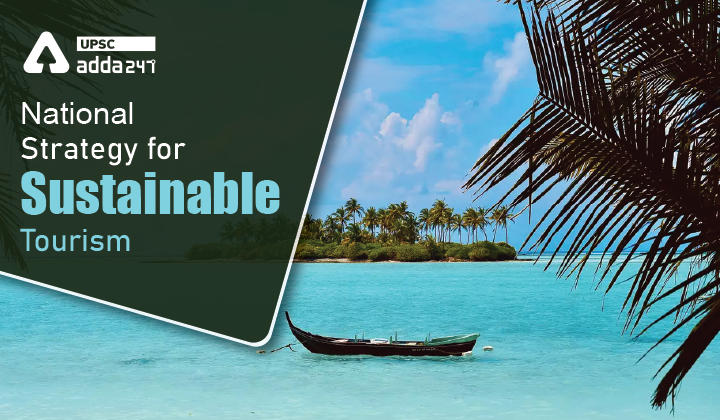Table of Contents
National Strategy for Sustainable Tourism: Relevance
- GS 2: Government policies and interventions for development in various sectors
Tourism in India: Context
- Recently, Ministry of Tourism has launched the National Strategy for Sustainable Tourism and Responsible Traveller campaign.
National Strategy for Sustainable Tourism: Key points
- Ministry of Tourism, in partnership with United Environment Program (UNEP) and Responsible Tourism Society of India (RTSOI) organized National Summit on Developing Sustainable & Responsible Tourist Destinations.
- In this summit, the Ministry of Tourism launched the National Strategy for Sustainable Tourism and Responsible Traveller Campaign.
National Strategy for Sustainable Tourism
- Strategic pillars for development of sustainable tourism:
- Promoting Environmental Sustainability,
- Protecting Biodiversity,
- Promoting Economic Sustainability,
- Promoting Socio-Cultural Sustainability,
- Scheme for Certification of Sustainable Tourism,
- IEC and Capacity Building and Governance.
- Relation between tourism and environment:
- Tourism and Environment share a Special Relationship.
- Their interaction with each other is a two-way process. On the one hand environmental resources constitute one of the basic ingredients of tourism. The natural and manmade setting form the tourism products which the tourist enjoys, live in, and relax.
- On the other hand, the close and direct relationship between visitors, host communities and local environment creates a sensitive situation, whereby tourism can be both very damaging but also very positive for sustainable development.
- State tourism policies should recognise sustainability principles and the Sustainable Development Goals in their vision and strategic direction for tourism.
- Swadesh Darshan 2.0: The idea of Swadesh Darshan 2.0 is to undertake holistic development with the vision to develop Sustainable and Responsible Tourist Destinations. The Scheme will encourage adoption of principles of sustainable tourism including environmental, socio-cultural and economic sustainability.
Read current affairs for UPSC





 TSPSC Group 1 Question Paper 2024, Downl...
TSPSC Group 1 Question Paper 2024, Downl...
 TSPSC Group 1 Answer key 2024 Out, Downl...
TSPSC Group 1 Answer key 2024 Out, Downl...
 UPSC Prelims 2024 Question Paper, Downlo...
UPSC Prelims 2024 Question Paper, Downlo...




